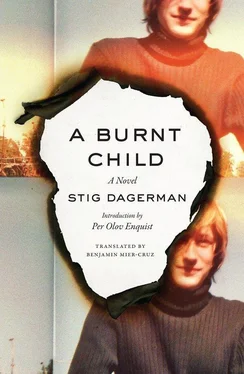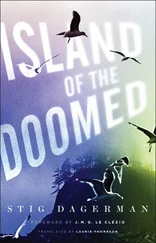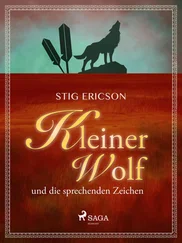Avoid the fire.
The door shuts behind him. He trudges down the hallway. The floor slants slightly. At the mouth of the hall, there is a waiting room with a table, chairs, and monthly newspapers. He sees them before they see him. No one is reading, even though they all have newspapers in their laps. As he gets closer, he realizes that he loves all three of them.
They take a taxi home. He is immensely tired and immensely happy. They are all immensely tired. When they enter the building, he recognizes the smell at once. Even the smell of the apartment is the same: linoleum, food, and fabric. He even loves the smell.
His room hasn’t changed. They help him to bed. The father undresses him and puts on his nightshirt. As the son lies in bed, the father strokes his hair.
My boy, he says, you shouldn’t study so hard. You should rest for a while.
Then the son strokes the father’s hair with his right hand. Gun comes and says good night from the doorway. One of her cheeks is red. He has an incredible urge to touch her. When the father leaves, she comes in, too, but just for a second. She doesn’t say a word; she only lets him caress her where it stings.
Berit stays the longest, pulls up a chair, sits there, and watches him.
You are not allowed to die, she whispers.
She does not cry. Never again will she cry as she used to cry before. He lets her give him a long kiss because he does love her, too. She will sleep overnight in the kitchen. As she is about to leave, he asks her to take out the letter from his jacket pocket. Then he asks her to rip it to shreds.
As he listens to her ripping it apart over his desk, he falls asleep. Deep and blissfully.
You ask why. I will tell you why. It’s because I’m tired of living. Tired of living here in this world of little dogs, this dog world of measly emotions, measly pleasures, and measly thoughts. We’re supposed to be content, but I don’t want to be content. I don’t want to be satisfied like a little dog, because there’s nothing more loathsome than little dogs when they come home frightened and pleased from their little dog adventures. I myself have been a big dog. But I don’t want to be a big dog either. Even if it is better to be a big dog than a little one. So we have no other choice but to be either a big dog or a little dog.
I’ve been a big dog because I have deceived all of you. But I’ve also been a little dog because I’ve deceived myself, too. We all deceive ourselves in the land of little dogs, and we can only dream of having little dog adventures. But all of us are afraid of the greatest adventure of all: to live purely. Little dogs have a panic-stricken fear of this one great adventure, because for them only truly filthy adventures are worth living for. In the land of little dogs, indecency is worse than immorality. But they fail to realize that only one thing is truly immoral: to consciously want to hurt someone. Therefore, in the land of little dogs, passive malice is more esteemed than active goodness.
In the land of little dogs, we are all cheaters, and we do everything in fun. In fun, we feed all the little dogs with scraps of our emotions. In fun, we tell ourselves that we love every measly dog we meet. Therefore, no one can truly love in the land of the little dogs and nothing is genuine. Not even duplicity is real there. In the land of little dogs, even cheaters cheat at their own fixed game. And in the land of little dogs, you don’t need any faith. So no one has any. But if anyone does happen to have any faith, they only have it in jest, because everything is a joke in the land of little dogs.
In the land of little dogs, the older dogs have nothing to say to the younger dogs. And if they did have something to say, they wouldn’t dare say it, because nobody believes in anything they say themselves. Not even their lies are truly mendacious. Because in the land of little dogs, the truthful ones tell lies and the liars tell the truth, so everything is always true and always false. Everything can be proven, thesis as well as antithesis. And we’d believe in both in the land of little dogs if only anyone dared to believe at all.
No one is happy or unhappy in the land of little dogs. The prevailing pleasure is indifference, the only valid feelings are small ones, and the only thoughts are even smaller. And only the most insignificant of feelings are beautiful. In the land of little dogs, reason is never beautiful. In the land of little dogs, you can never understand that the only thing keeping the state of the little dogs from being completely unbearable is that the reason of the big dogs is able to analyze it.
In the land of little dogs, everyone could live how they pleased if only anyone knew what they wanted. But in the land of the little dogs, no one believes in their aspirations, because everyone knows that they themselves are lying cheats. There’s only one wish in the land of little dogs, and that is to want to always be someone else. Everything is fluid in the land of little dogs, even stones. And the stone of dishonesty displaces the stone of honesty. There, even the masks wear masks. And to don yet another mask is called unmasking.
The land of little dogs is a place where it’s considered shameful to live. And if it weren’t considered shameful to die, too, then several would prefer that as well. Besides, it’s even shameful to be ashamed in the land of little dogs.
Only he who is not at home in the land of little dogs will be left to become a big dog. And the only advantage of being a big dog in a world of little dogs is that you are no longer afraid to die. But a big dog—least of all a big dog—cannot escape the shame of living either.
This is why I’m doing what I’m doing.

YOU WAKE UP HAPPILY, feel the wound aching mildly, and remember. You tug at the bandage and smile in the darkness at the unimaginable. It doesn’t hurt, and you are glad. You are brave, too, daring to turn on the light with your good hand. This time, you aren’t afraid when you look into your own eyes; there was never a time before when this didn’t frighten you. Your suicide note is on the desk, ripped to shreds. And when you turn out the light, the pieces continue to glow. You also manage to keep looking at yourself without becoming afraid. Brave and serene, you rest in the arms of the world. And little by little, you are infused with a warm certainty: you didn’t do it to die or to be saved either—but to have peace. Peace with everything inside of you that wanted to die, peace with everything outside of you that pressured you to live. Otherwise, nothing has happened, nothing but some loss of blood and the fact that you have become a little older. You also understand that in order to begin to live, you must have already begun to die.
The father comes in early, turns on the light, pulls a chair up to his bed—sitting down gently as one does at a sick person’s bed-side—and says nothing. The son is awakened by his silence. He rouses gently and quietly. They look at each other in prolonged silence. At first, the silence is frigid but then it starts to thaw out. At first, they are both alone, alone as they have always been in each other’s company. The father sits there and plays with his yardstick: pulling it out, folding it up, measuring the loneliness and the silence. They hear Berit wake up in the kitchen, and the alarm clock rings in the other room.
My boy, the father whispers.
Then the unimaginable happens. A wave of warmth gushes through the room. The father drops his yardstick, holds the son’s unwounded hand in his, and brushes the hair from his forehead.
Читать дальше













